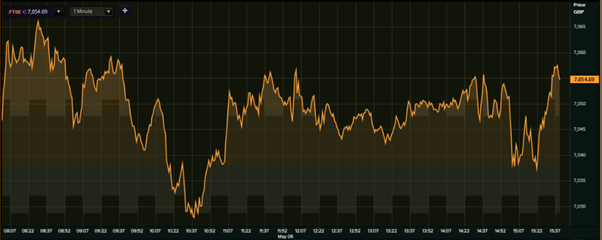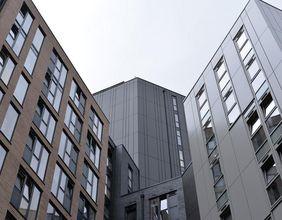Summary
- FTSE 100 was trading little higher at 7,054.71, up 0.22 per cent
- mid-cap reflector FTSE 250 traded relatively higher
- BoE MPC decided to hold rates at record low
- UK services sector recorded the highest peak since October 2013
- Millions in the UK stepped out to cast their vote in England, Wales and Scotland
UK shares traded marginally higher in the late afternoon deals on Thursday, 6 April, even after the Bank of England left the interest rate unchanged at a record low of 0.1 per cent. Governor Andrew Bailey led nine-member Monetary Policy Committee (MPC), in its meeting ended on 5 May, unanimously voted to maintain the interest rate at 0.1 per cent.
The BoE on Thursday said the UK GDP is expected to see a drop of 1.5 per cent in the first quarter of 2021.
According to the latest data available with the London Stock Exchange, FTSE 100 was trading little higher at 7,054.71, up 0.22 per cent from the previous close of 7,039.30. During the session so far, the benchmark index has hovered between a low and high of 7,026.75 and 7,067.62, respectively.
FTSE 100 chart (6 May)

(Source: Refinitiv, Thomson Reuters)
The mid-cap indicator FTSE 250 traded relatively higher as compared to the headline FTSE 100. The index lost a considerable chunk of gains during the early afternoon trades but somehow managed to hold in the positive territory at 22,465.60, up 0.36 per cent from the previous close of 22,385.90.
The central bank said the GDP is expected to witness a sharp reversal in the Q2 2021 following the series of easements across the United Kingdom, the expanding scale of the Covid-19 vaccine roll-out, and the hopes of better-than-anticipated growth in the commercial setups. The bank further believes a rebound in GDP levels to the pre-pandemic levels over this year.
However, the bank continued to remain uncertain, as far as the economic outlook is concerned with regard to the relative changes in the demand and supply.
Meanwhile, the IHS Markit/CIPS UK Services PMI soared to 61.0, recording the highest peak since October 2013, majorly supported by the easing of restrictions in April and a considerable rise in forward bookings on the hopes of upcoming moderations.
Amidst of all this, millions of people in the UK stepped out to cast their vote in the first elections held since the onset of the coronavirus pandemic.
Due to the prevailing pandemic conditions, a number of safety protocols were instituted by the polling administration including mandatory usage of hand sanitisers, social distancing markets, plexiglass screens, sterilisation of surfaces and one-way systems. Under the elections held across England, Wales and Scotland, individuals were advised to bring their own pen or pencil.





